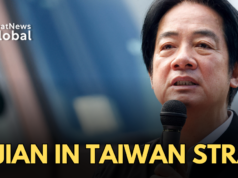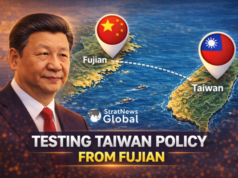China’s aggression over the last few years, backed by rapid military modernisation, has made it stand out as an alternative to the United States. But despite this, Chinese President Xi Jinping is unlikely to attack Taiwan in the current geopolitical landscape, believes Richard McGregor, Senior Fellow at Lowy Institute.
Speaking at an event titled “The World According to Xi Jinping” hosted by the Centre for Social and Economic Progress (CSEP) in New Delhi, McGregor argued that China and Xi are not ready for the economic impact a war with Taiwan may have. According to him, despite Xi being a risk-taker, a war with Taiwan may still not be worth the gamble for China.
While Xi displays an aggressive front to the U.S., he is a realist, who has also learnt from his best friend Putin’s war with Ukraine. Invading Taiwan would provoke an anti-China sentiment around the world with considerable home damage, which Xi may not be ready for.
“If Xi starts a war with Taiwan, China’s global supply chains will be disrupted and its already struggling domestic economy can face double the lows than it did during the COVID19 pandemic,” McGregor felt.
Adding to that perspective, Shivshankar Menon, Distinguished CSEP fellow, former National Security Adviser and Ambassador to China noted that Xi uses the sentiment of nationalism to legitimize the continuous monopoly on power of the Chinese Communist Party.
“Xi has glorified the imperial past. He has trapped himself in history to feed people dreams. This has led several Chinese scholars to believe that China will rule the world,” he said.
However, McGregor hinted that while this may be true, China’s future plans may not fully be in Xi’s control. China already faces the threat of tariffs that the Trump administration is likely to impose. McGregor noted that despite Xi’s best efforts to bring America to align with China on this one, Republicans and Democrats alike have displayed support for Taiwan, irrespective of Trump’s stand on a defence treaty with Taiwan. So then, can China afford to move in a way that brings U.S. troops near its coast?
McGregor believes that it is unlikely. He said that China has integrated foreign systems with its contributions far more than adopting it. Xi’s policy play has also focused on a global outlook. From the highest number of embassies in the world, to providing lending to smaller countries and making inroads into several economies through its export culture, Xi’s whole game seems to have been about doing to the U.S. what the U.S. has done to others.
So unless Taiwan decides to do something extreme such as declaring independence from China, which it doesn’t show signs of doing, Xi is likely to take a passive approach in this scenario. His priorities may not be very clear yet, but his power lies in his moves. As Chinese military strategist Sun Tzu says, “The whole secret lies in confusing the enemy, so that he cannot fathom our real intent.”




